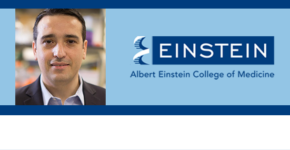 How do we kill cancer cells that are resistant to the proteins that look to kill them?
How do we kill cancer cells that are resistant to the proteins that look to kill them?
Evripidis Gavathiotis, associate professor of biochemistry at the Albert Einstein College of Medicine, explores a new treatment to get rid of these harmful cancer cells while leaving the healthy ones intact.
Dr. Gavathiotis’ laboratory aims to elucidate and target molecular signaling mechanisms of cell death and survival signaling pathways that are deregulated in cancer and other diseases. His research focuses on understanding the protein interaction network of the BCL-2 family of proteins that controls apoptosis, necrosis and mitochondrial physiology and regulators of chaperone-mediated autophagy process. His goal is to translate our mechanistic insights of protein interactions into novel pharmacological strategies and chemical probes that can be used for target validation and serve as the basis for novel therapeutics. His research approach is at the interface of chemistry and biology combining techniques from chemical biology, structural biology, cellular biology and pharmacology. His interest in cardiovascular research currently focuses on targeting BAX/BAK-mediated cell death and chaperone-mediated autophagy to protect premature loss of cardiac cells and ensure their proper survival. Dr. Gavathiotis aims to apply his research in myocardial infarction (heart attack) and prevention of heart failure.
Cell Death and Cancer Cells
Cell death is an important process during development and adulthood that rids the body of unwanted or malfunctioning cells. One form of programmed cell death is called apoptosis.
A protein called BAX is known as “the executioner protein” because it guarantees this cell death process. In the case of cancer cells, we want the cell death process to work well.
But quite often, cancer cells manage to prevent BAX from killing them by producing another protein that suppresses BAX.
We have discovered the first compound that helps BAX directly trigger cell death in certain cancer cells while sparing healthy cells. This compound helps BAX overcome cancer’s resistance to cell death which means that BAX can swing into action and kill cancer cells while leaving other cells unharmed.
We tested this treatment against acute myeloid leukemia or AML.
AML accounts for almost one-third of new leukemia cases and kills over 10,000 Americans annually. The survival rate is low, and we need to find better treatments.
Our research focused on finding a compound to activate BAX. We screened over one million compounds and tested 500. One was most potent — it caused cell death in malignant cells from human AML cell lines and blood samples from AML patients. This compound, BTSA1, did not affect the healthy blood cells of these patients.
Then, we tested our compound in animals. Mice treated with BTSA1 survived longer than control mice. Once again, the compound caused cancer cells to die but it did not harm healthy cells and tissues.
Next, we will test our compound on animal models of other cancers. We hope the compounds we develop will lead to more effective treatments that help the executioner protein do its job — killing cancer cells faster and more efficiently, with fewer harmful effects for patients.

